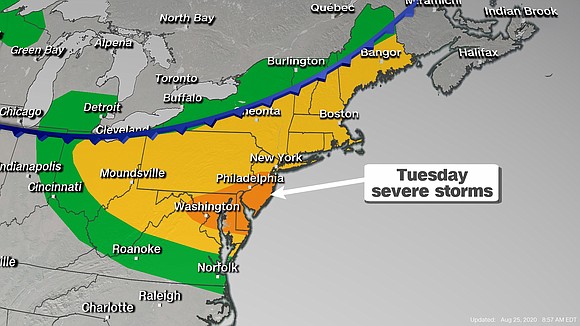Over 70 million people under the threat for severe weather
CNN/Stylemagazine.com Newswire | 8/25/2020, 2:15 p.m.
By Allison Chinchar, CNN Meteorologist
(CNN) -- Over 70 million people are under the threat for severe weather across the Northeast and Mid-Atlantic on Tuesday.
New York, Boston, Providence, and Hartford are all under the threat for severe storms this afternoon and evening as a cold front pushes through the region. Even higher severe storm chances exist for Philadelphia, Baltimore, and Washington.
"The greatest severe-thunderstorm threat today appears to be for damaging thunderstorm winds over portions of the Mid-Atlantic," the Storm Prediction Center (SPC) says.
In addition to damaging winds, there will also be a threat for hail.
Multi-day severe threat
Some locations, such as Pittsburgh and Cleveland, will have a threat for severe storms both Tuesday and Wednesday.
"A stalled front will extend from the upper Great Lakes southeast into the Middle Atlantic region early Wednesday," the SPC details.
There is still some uncertainty regarding the level of severity with some of these storms.
The main threats will still include damaging winds and hail, but there is also the potential for isolated tornadoes.
For Boston, New York, and Providence, Rhode Island, there will only be small break on Wednesday before the severe threat returns Thursday. As of right now there is only a level 2 out of 5 threat on Thursday from Nebraska through Massachusetts, but areas of the Northeast may need to be upgraded to higher probabilities as we get closer to the actual event.
Additional severe storms from Hurricane Laura
Separately, there is also a chance of severe storms on Wednesday from Hurricane Laura.
This will mainly affect the Gulf Coast states of Texas, Louisiana, and Mississippi. The main threats in this region will be damaging winds, tornadoes, and waterspouts.
"Hurricanes and tropical storms that make landfall in the Gulf of Mexico are more likely to produce tornadoes compared to storms in the Atlantic," explains Brandon Miller, CNN meteorologist. "That is because the "right-front" quadrant is where a bulk of tornadoes form — this has to do with the wind directions in that part of the storm. With Gulf landfalls, this right-front quadrant is directly over land, whereas Atlantic-landfalls typically have the right-front over the ocean until the storm is well inland."
However, not all coastlines on the Gulf of Mexico are equal in terms of this threat.
"Note that this is less true for Texas landfalls in the Gulf — since the coastline angles more south to north like the Atlantic East Coast, rather than east to west like in the northern Gulf of Mexico coastline of LA/MS/AL/FL Panhandle," Miller clarifies.
In other words, a landfalling tropical system in Louisiana would likely produce a few more tornadoes than a landfall in say Galveston, Texas.




